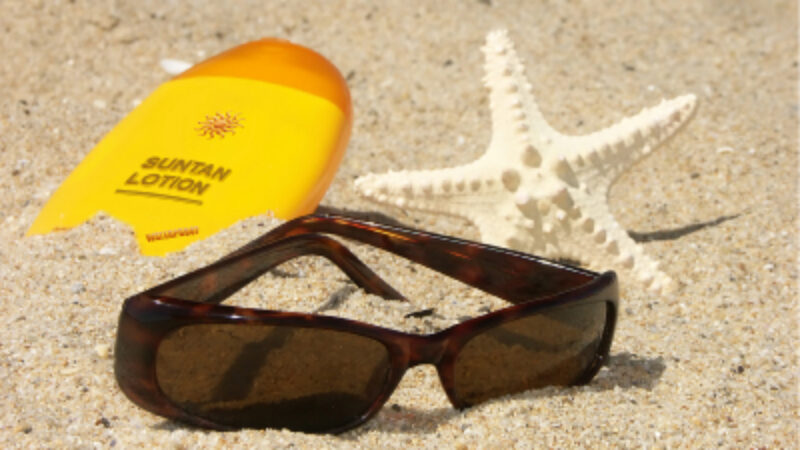If you lean towards organic and natural skin care products then it’s likely that you’ll want to skip the chemical sunscreens and opt for a natural sunscreen with zinc oxide or titanium dioxide.
Natural sunscreens with zinc oxide or titanium dioxide are often referred to as physical sunscreens because they work primarily by sitting on top of the skin’s surface and providing a barrier against UV rays, deflecting them away from the skin and preventing any harm. Chemical sun filtering agents, on the other hand, work mainly by being absorbed into the skin’s top layer and deflecting UV rays or absorbing their energy and converting them into something harmless.
Natural Sunscreen vs Chemical Sunscreen
The choice is ultimately yours because both chemical and natural sunscreens can deliver protection. However, if you are specifically looking for a natural sunscreen, read labels carefully. Some sunscreens claim to be ‘natural’ but really aren’t. Since the term natural isn’t regulated, its definition is open to interpretation so you need to know what you’re after. Sunscreens marketed as being natural should contain only zinc oxide or titanium dioxide as their sun filtering agents. Ingredients including oxybenzone, octinoxate, avobenzone, Mexoryl SX, Mexoryl XL and Tinosorb are considered chemical sun filters. While they are effective in protecting against UV rays, they work differently. Some, including oxybenzone and octinoxate have been associated with side effects including hormone disruption and skin allergies so choose carefully. In general, newer filters such as Mexoryl SX and Mexoryl XL (found in Anthelios sunscreens) or Tinosorb sunscreens found in some Anthelios sunscreens as well as Avene Sunscreens are not associated with these side effects and offer effective protection against both UVA and UVB rays.
Some sunscreens (both natural and chemical) may contain additional ingredients, including green tea, Vitamins C or E, which deliver antioxidant activity that help to enhance the effectiveness of sunscreens. And, they can also fight free radical damage associated with sun exposure.
Natural Sunscreen with Zinc Oxide vs Titanium Dioxide
Does a sunscreen need to contain both zinc oxide and titanium dioxide to be effective? No. Zinc oxide provides protection against the full UVA and UVB range; it covers from 290 to 380 nm. In fact, it is the only sun filtering agent that delivers such broad spectrum protection against UVA and UVB rays. Titanium dioxide, on the other hand, protects well against UVB rays and short UVA rays, but not against longer UVA rays. For this reason, sunscreens containing titanium dioxide as its sole sun filtering agent are not a good idea.
Products at PhaMix with Zinc Oxide
If you are looking for a natural sunscreen with zinc oxide, consider the following:
- Apothekari Dermaceuticals Shade SPF 30. Formulated with 13.5% zinc oxide to deliver broad spectrum UVA/UVB protection against sun exposure. Added antioxidants to protect against free radical damage.
- Neostrata Sheer Physical Protection SPF 50. Mattifying fluid sunscreen with titanium dioxide and zinc oxide plus antioxidant protection as well.





what is the best percent of both zinc oxide and titanium dioxde for effective sun screen
best regards
For Ayman, both zinc oxide and titanium dioxide are effective physical sun filters. The percentages will depend on whether they are the main active ingredients or whether they are supporting other sun filtering ingredients such as avobenzone, mexoryl, or octocrylene. If you are looking at a purely physical sunscreen, a concentration of 15% to 20% zinc oxide is effective. As a supporting ingredient, 3% titanium dioxide is standard. For a zinc oxide based product, we recommend Keys Solar Rx SPF 30+. Best wishes from Sharmani
Be aware that titanium dioxide and zinc oxide often have nanoparticles, which research is showing may cause cancer and other health problems….
Really cool post, highly informative and professionally written..Good Job
CAn you please guide for which is the lotion or moisturizer for skin includes face , hands and legs too. And which contain spf too..
For Sonali,
Thanks for your question. Please visit our website to view our selection of body moisturizers here and facial moisturizers here. If you are looking for a moisturizer with sun protection, we would suggest either the La Roche Posay Hydraphase UV SPF 30 or the Anthelios KA SPF 100.
We also carry some Anthelios sunscreens specifically for the face which, for many of our customers, provide enough hydration to make a separate moisturizer unnecessary. Please take a look at our website here for sunscreens or call us for more assistance.
Best, Sharmani
I’ve found that zinc only sunscreens protect my family from burns, but not tans, which are also sun damage. I used ThinkSport (20% zinc oxide) for 3 years. We never burned one, but we got tan every year. Last year I switched to Blue Lizard Baby/Sensitive which contains zinc oxide and titanium dioxide and now we stay the same color. No more tans. It rates a 1 on EWG.